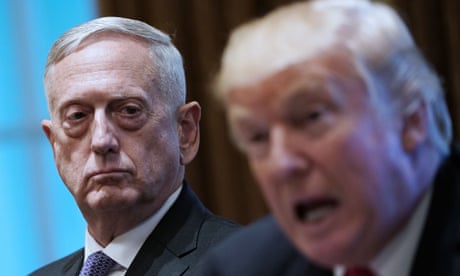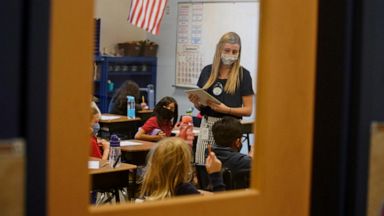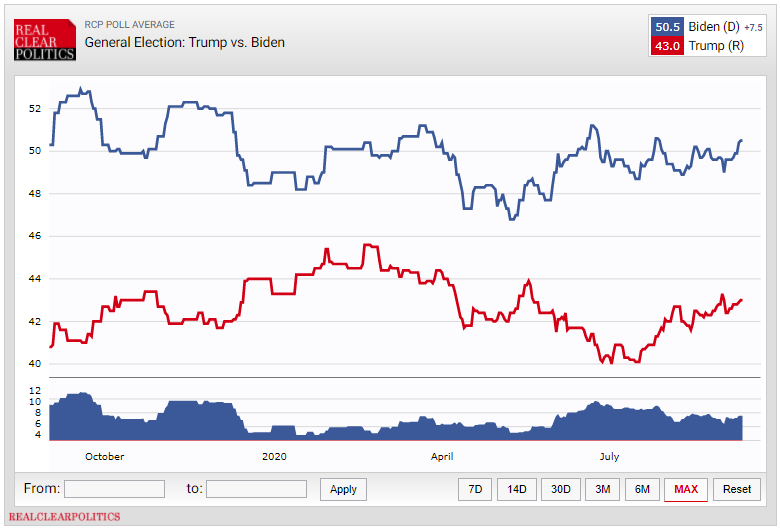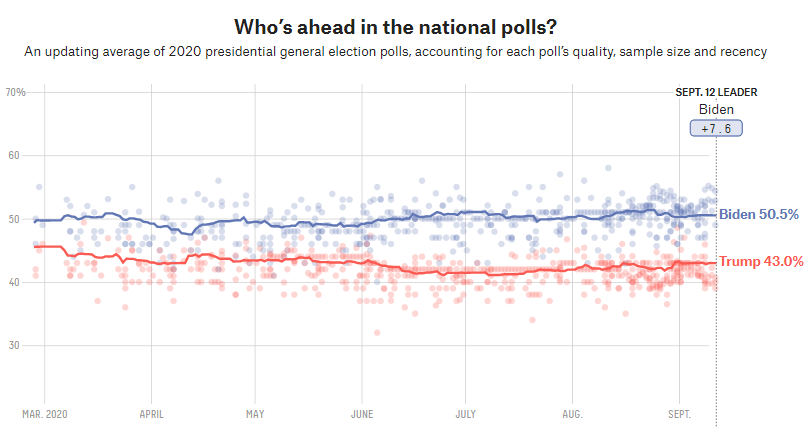Trump officials interfered with CDC reports: Politico
The CDC's weekly MMWR reports are the key link between the CDC and the public.
Politically appointed members of the Department of Health and Human Services' communications teams were allowed to review, change and delay reports authored by the Centers for Disease Control and Prevention, according to a bombshell report published by Politico late Friday.
The Politico report said that the CDC's Morbidity and Mortality Weekly Reports, a public report compiled by scientists that's served as the key communication avenue between the CDC and health care providers, researchers, journalists and the public since the 1980s, has been tinkered with when CDC findings didn't align with President Donald Trump's public statements about coronavirus.
ABC News has not independently confirmed the Politico report.
"[The assistant secretary for public affairs] clears virtually all public-facing documents for all of its divisions, including CDC," Michael Caputo, a spokesperson for the Department of Health and Human Services, confirmed to ABC News.
"Our intention is to make sure that evidence, science-based data drives policy through this pandemic -- not ulterior deep state motives in the bowels of CDC," Caputo, a former Trump campaign official with no scientific or medical background, said in a statement.
According to Politico, in one instance, Caputo and his team pushed to retroactively adjust CDC reports that they said inflated the risk of COVID-19. The critique, in the communication team's opinion, was that the CDC reports did not explicitly point out that Americans with COVID-19 could have become infected because of their own behavior, according to the Politico story.
In another instance, Caputo's team tried to slow down a CDC report on hydroxychloroquine, the controversial malaria drug that Trump frequently referenced as a potential COVID-19 treatment during press briefings. A report about hydroxychloroquine that said "the potential benefits of these drugs do not outweigh their risks" was withheld for roughly a month while the team investigated the CDC author's political leanings, according to Politico.
Several CDC staff members told ABC News they were infuriated to learn Caputo's team made attempts to revise the weekly reports in ways inconsistent with science, something they would have previously thought not possible.
Democratic nominee Joe Biden weighed in on the Politico report via his campaign manager.
"When Donald Trump told Bob Woodward that he wanted to downplay the virus, this is the exact kind of repugnant betrayal that he meant," Kate Bedingfield, Biden's deputy campaign manager, said in a statement.
"This report is further proof that the Trump Administration has been systematically putting political optics ahead of the safety of the American people," she added. "Trump's failure has left us with 6 million infected, millions more unemployed, and the worst outbreak in the developed world. We deserve so much better."
Political appointees demand ability to rewrite CDC case reports
"CDC to me appears to be writing hit pieces on the administration," reads one email.
JOHN TIMMER - 9/12/2020
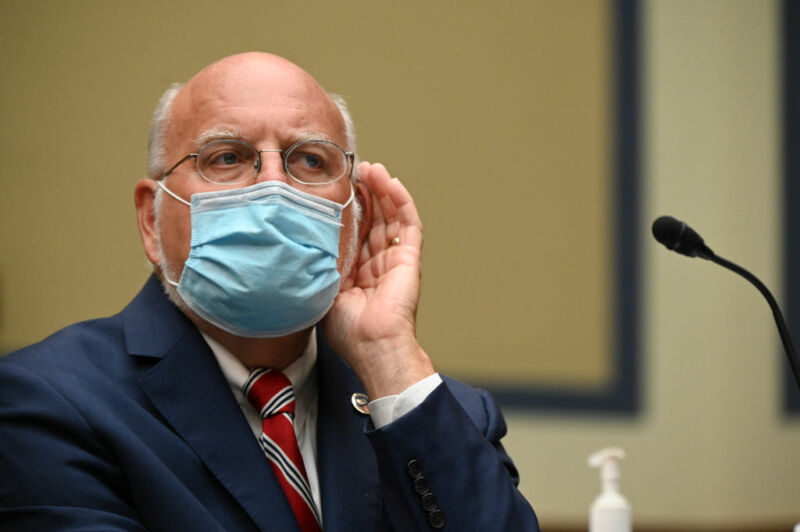
Enlarge / Robert Redfield, director of the Centers for Disease Control and Prevention (CDC), listens during a House Select Subcommittee on the Coronavirus. Redfield may be finding himself trapped between scientists and political appointees.
Political appointees in the Department of Health and Human services are objecting to reports on the COVID-19 pandemic from the Centers for Disease Control, and are trying to exercise editorial control of future reports. That's the bottom line of an extensive report from Politico that was based on both internal emails and interviews with people in the organization. The problems apparently stem from the fact-based reports from the CDC running counter to the Trump administration's preferred narrative about the spread of the pandemic and the appropriate public health responses.
The CDC documents at issue are termed Morbidity and Mortality Weekly Report, which provide rapid summaries of the state of our knowledge about public health issues. Typically, they're the product of a CDC-backed investigation into a known issue; in the past, they've focused on things like outbreaks of food-borne illnesses. While they don't have the weight of peer-reviewed literature, they're widely considered to be scientifically reliable, and their rapid publication makes them a valuable resource for public health officials.
It's easy to see how the reports' accurate information could be viewed as counter to the preferred message of the Trump administration. Trump has made reopening schools a centerpiece of his pandemic policy, but CDC Morbidity and Mortality Weekly reports have described how SARS-CoV-2 can spread rapidly in a school-aged population, how young children can bring the disease home and pass it on to adults, and how children can suffer severe complications from the disease.
Rather than recognizing that facts aren't supportive of their policies, the administration's political appointees have apparently decided that the CDC is not presenting the facts because it's trying to undercut Trump. Politico quotes Michael Caputo, a former Trump campaign official now at Health and Human Services, as saying "Our intention is to make sure that evidence, science-based data drives policy through this pandemic—not ulterior deep state motives in the bowels of CDC." One of the emails obtained for the story, written by another political appointee, says "CDC to me appears to be writing hit pieces on the administration," and another accused the reports of being used to "hurt the president."
Paul Alexander, one of the few involved who has an epidemiology background, complained in another email, "CDC tried to report as if once kids get together, there will be spread and this will impact school re-opening... Very misleading by CDC and shame on them." Yet that's exactly what appears to be happening in many locations, suggesting the CDC has a better grasp on the issue than Alexander does.
The political staff has attempted to block the release of some of the Morbidity and Mortality reports, and demanded the ability to review and edit all future reports. (Alexander, apparently unironically, suggested he needed to ensure the reports were "fair and balanced.") While all of the planned reports were eventually published, Politico indicates that the non-scientific staff are gaining increased oversight of the reports prior to their publication
Trump ally who sought to change CDC Covid reports claims he was fighting 'deep state'
- Politico: emails show attempts to change key reports
- HHS spokesman Michael Caputo worked on campaign in 2016
- Rage: Will Bob Woodward’s tapes bring down Donald Trump?
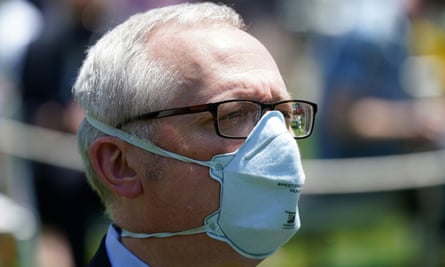
A former Trump campaign official now spokesman for the US health department sought to change key reports on the coronavirus pandemic, in some cases “openly complaining” that they “would undermine the president’s optimistic messages about the outbreak”, according to internal emails seen by Politico.
The official, Michael Caputo, told the website he was attempting to stymie “ulterior deep state motives in the bowels” of the Centers for Disease Control and Prevention, or CDC.
The news comes after reports that a whistleblower at the Department of Homeland Security said he was told to stop making Donald Trump “look bad”, via reports on Russian election interference.
It also comes as a new book by Bob Woodward details the president’s reasoning behind optimistic messaging about the coronavirus outbreak.“I wanted to always play it down,” Trump told Woodward in March, more than a month after telling him the virus was “deadly stuff”.
“I still like playing it down, because I don’t want to create a panic.”
Trump’s comments – and Woodward’s decision to save them for his book – caused outcry. According to researchers at Johns Hopkins University in Maryland, 6.4m people have been infected in the US and more than 192,000 have died. Other counts put the death toll over 200,000.
Caputo, who became spokesman for the Department of Health and Human Services in April, is a Republican consultant who worked on the Trump campaign in 2015 and 2016. He has links to Russia, having worked in the country’s energy industry, and to Roger Stone, a Trump ally whose sentence arising from the Russia investigation was commuted by the president.
Politico reported that under Caputo’s direction, CDC Morbidity and Mortality Weekly Reports were subject to “substantial efforts to align … with Trump’s statements, including the president’s claims that fears about the outbreak are overstated, or stop the reports altogether”.
“Caputo and his team have attempted to add caveats to the CDC’s findings,” the website said, “including an effort to retroactively change agency reports that they said wrongly inflated the risks of Covid-19 and should have made clear that Americans sickened by the virus may have been infected because of their own behavior.”
One report Caputo’s team tried to stop, the website said, concerned hydroxychloroquine, an anti-malarial drug which Trump and key aides pushed for use in treatment of Covid-19 but which studies have said can be dangerous. The report was published last week, reportedly after being held for a month because its authors’ political views were in question.
In one August email seen by Politico, another political appointee accused the CDC of writing “hit pieces on the administration” and trying to “hurt the president”.
Caputo told the website: “Buried in this good [CDC] work are sometimes stories which seem to purposefully mislead and undermine the president’s Covid response with what some scientists label as poor scholarship – and others call politics disguised in science.”
He also said: “Our intention is to make sure that evidence, science-based data drives policy through this pandemic – not ulterior deep state motives in the bowels of CDC.”
The “deep state” conspiracy theory, enthusiastically propounded by the president and senior aides, holds that a permanent government of bureaucrats and intelligence officials exists to thwart Trump’s agenda.
Trump recently claimed that the “deep state” was responsible for the Food and Drug Administration delaying approval for unproven Covid therapeutics.
Steve Bannon, a former Trump campaign manager and White House strategist now under indictment for fraud, was a key early proponent of the “deep state” theory.
He is on record saying it is “for nut cases” and “none of this is true”.

